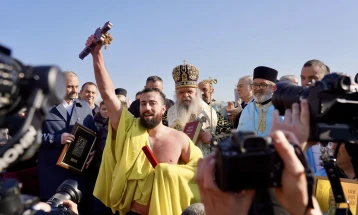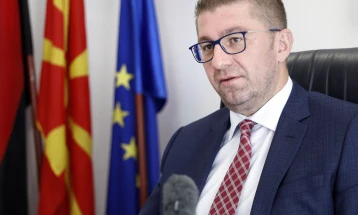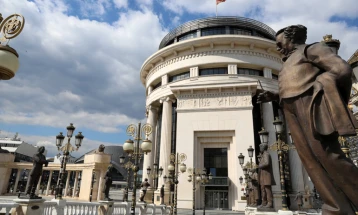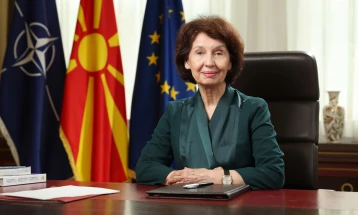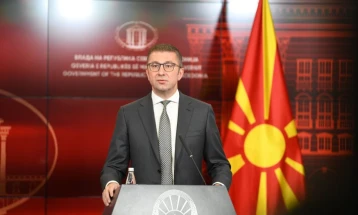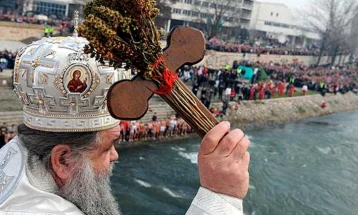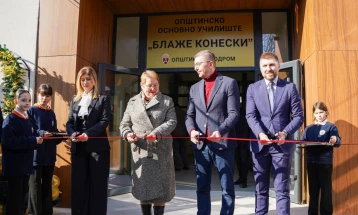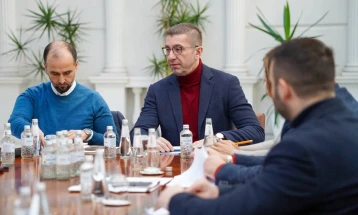My only goal as EU Ambassador is to assist the country to join EU, says Rokas
- The only goal in my mandate is to assist the country to get to the EU as soon as possible, EU Ambassador Michalis Rokas tells MIA in an interview, his first since arriving in the country last month.
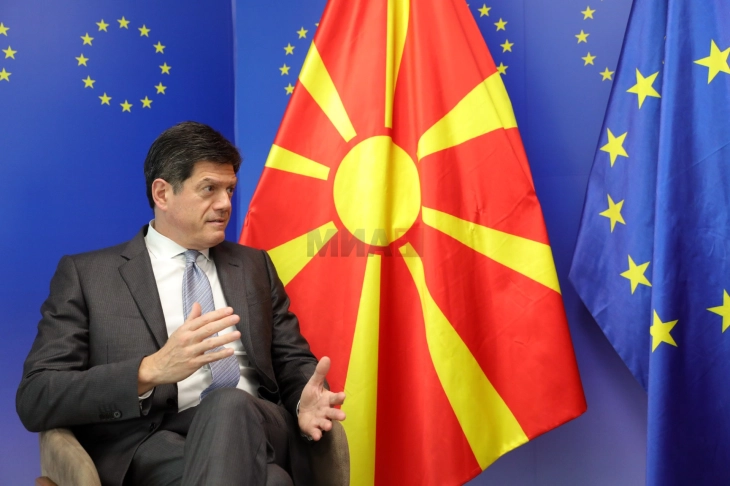
Skopje, 13 October 2024 (MIA) – The only goal in my mandate is to assist the country to get to the EU as soon as possible, EU Ambassador Michalis Rokas tells MIA in an interview, his first since arriving in the country last month.
EU membership has no alternative, he stresses, and enlargement is the bloc’s most successful policy. Rokas in the interview says he understand the government’s proposal on delayed implementation of the constitutional amendments, noting that the accession process is based on unanimity.
“As you know enlargement is a process based on unanimity; we are well aware of this proposal of the government. My humble opinion is that it is unlikely to be accepted, as I explained before there is an EU position of 27 in this regard. So, of course it is essential to ensure that we are aware of this context. Decision on constitutional amendments is a sovereign decision of the government, is a very important one, we have a tremendous respect of how the government wants to proceed and the solutions that or is seeking to achieve, but the process is quite clear and it can be immediate and it can go very fast. What I can reiterate is that full commitment of the EU accession which includes North Macedonia,” Rokas says.
The new EU Ambassador to Skopje in the interview also talks about reforms in the judiciary, recommendations of the peer review mission, the Growth Plan for the Western Balkans, BRICS, EU-China relations, etc.
Ambassador Rokas, you arrived in the country almost a month ago. Your term started at the same time as the term of the new government. What are your first impressions?
I am delighted to be in the country. It is also a new term for myself, it's the first time in the Western Balkans after 22 years in the Asia Pacific, but also a time where there is a new impetus from the EU enlargement - it got as a top priority on our agenda. The welcome has been very warm. We had great discussions. I have been doing the first round of meetings focusing especially with the government, the Prime Minister, the Deputy Prime Minister, minsters and other key stakeholders. I saw and I am extremely pleased that we have joint common goal which is to accelerate towards the path to accession.
North Macedonia and Albania were decoupled on their EU path. Hungarian PM Viktor Orban during his visit to the country offered to serve as a meditator in the Skopje – Sofia talks and stressed that the country must open negotiations by the end of the year. The Bulgarian Foreign Ministry said meditation is not allowed between EU and a candidate country, whereas PM Hristijan Mickoski said the offer was made by a current EU presidency holder. How do you perceive Orban’s proposal?
You will allow me not to comment on member states positions, statements, this is not my role here. But what I can tell you is some facts. And the facts are that in July 2022 accession negotiations commenced, started both for Albania and North Macedonia and that allowed the screening process, which is an important prerequisite before formal negotiations can start. So, the fact is that there is also the Council conclusions from July 2022, which for North Macedonia they clearly stipulate that the country would need to adopt the constitutional amendments and once those amendments are adopted, there will be automatically, immediately, the intergovernmental conference. So, this is the clear path and as I said in my introduction, for your first question, this is a moment of opportunity, there is definitely enlargement on top of the EU’s agenda, so we feel that this is a moment not to miss this opportunity.

PM Hristijan Mickoski during his September visit to Brussels met with top EU officials to discuss the idea of adoption of constitutional amendments with delayed effect. How does Brussels perceive this idea, called by the government “French Proposal Plus”?
Allow me to say that, as you know, enlargement is a process based on unanimity - we are well aware of this proposal of the government. My humble opinion is that it is unlikely to be accepted, as I explained before there is an EU position of 27 in this regard. So, of course it is essential to ensure that we are aware of this context. Decision on constitutional amendments is a sovereign decision of the government, is a very important one, we have a tremendous respects of how the government wants to proceed and the solutions that or is seeking to achieve, but the process is quite clear. It can be immediate and it can go very fast and what I can reiterate is that full commitment of the EU accession which includes North Macedonia.
With the assumption that the constitutional amendments will pass, will the EU give guarantees that Bulgaria will no longer have new conditions for North Macedonia and that our path to full-fledged membership will follow the merit system?
Again it would have to come back to what the enlargement process is. It is based on unanimity. We need to be aware that along the process from the moment that the negotiations start until the very end when your country becomes an EU member state, unanimity is required. So, in theory whenever there is no progress on the reforms, or on the inclusion of the Copenhagen criteria or the EU aquis into legislation, one or other member states could object at certain or before the end or at the certain parts.
So this is a fact, but thinking of this fact, I think we had six rounds of EU enlargement since the inception of the EU in various numbers of countries, I think that all of them despite the obstacles, despite the difficulties, despite the frustrations, despite the long process that took some times, the countries became members of the EU. I think that this we should have it in mind, but also we need to be fully aware of what the process entails. And it entails unanimity and support of the EU 27 throughout the process.

Ukraine has started negotiations with the EU for membership. We remember when Hungarian PM Orban in December 2023 was sent to have coffee while EU leaders were discussing the opening of negotiations with Ukraine. Do you think a similar decision could have been made about the country, too, since we’ve been in the accession process for over 20 year and we are aligned 100% with the EU’s foreign and security policy?
I want to commend North Macedonia for full alignment with the Common Foreign Security Policy, this is greatly appreciated, and this is an issue that I have underlined to all my interlocutors since I have arrived here. So, this is deeply appreciated and think is a testament of North Macedonia’s commitment towards the EU. I do not want to be repetitive or boring. The process for enlargement, including the decision on Ukraine, can either be voted and blocked by unanimity or anyone can block it, but this did not happen. The incident that you refer to it is not a method because actually there is no way around whether someone is present or not present, it doesn’t mean if it wants to block, it blocks, or otherwise it considers unanimity.
Judiciary reforms are one of the government’s top priorities, which has already announced it will reform the Judicial Council and the Council of Public Prosecutors. The peer review mission gave 40 recommendations for the Judicial Council to work professionally. Some of the short-term recommendations have been already implemented, while some of them require legal changes. Which direction should the reforms take according to your opinion?
I am very pleased that this is top priority for the government. I had the honour to discuss these matters with the Minister of Justice. I see strong commitment to work and follow up on these EU suggestions and recommendations, whether is the peer review, whether is the country report, whether is the special rule of law, whether is the progress reports. There is actually a lot of bases to work on. Now the priority should be the law on judicial council, some very important reforms that can be made from the manner that it is formed, how you hire and dismiss judges. So, there are a lot of elements that work is vast and it has progressed relatively quickly. This is the key area for everything, fighting corruption, attracting investments, giving confidence of the people to the judicial system. I see that there is fair commitment and also from the EU side, there is a lot of support by ongoing projects or projects that are going to be tailor-made according to the new legislation that we expect the government to adopt in the coming months.
After the European Commission has adopted the Reform Agenda when can we expect the first tranche of EUR 52.5 million? Do you believe that this plan will enable candidate countries to come close to the economic growth of EU members and will the citizens of candidate countries be able to feel the benefits?
After the adoption, we hope we'll sign the relevant agreements on the loans, on the facilities soon. The first tranche can be disbursed before the year end. I am confident about that. Also, it is an opportunity for me to commend the Growth Plan, the reform agenda. It is a very solid, robust project that was presented by the government and this happened despite the fact that we had the elections and we had to work very rapidly on it.
I believe that the reform agenda, the Growth Plan, they give a unique opportunity to the Western Balkan countries not only to gradually integrate to the EU and the internal market, but it shows the commitment to enlargement and it shows also that in order to accelerate not only the accession path but achieving prosperity because a lot of the EU prosperity is based on the internal market the success of the EU rules.
Also at the same time we hope that the Western Balkan countries will move quickly to achieving their own regional market this would facilitate the things a great deal.
The new mechanism allows a lot of flexibility to the government. You now the difference between IPA mechanisms and now the Growth Plan are different, IPA mechanisms are per sector whereat these can put throughout according to the priorities of the government. But the gradual integration to the EU internal market I think is unprecedented and it is a testament to the frankness and priority that EU attaches to enlargement at times, geopolitically, geostrategically, we face immense challenges. We strongly believe that the answer is to have one European family which of course includes the rest of Balkans.

The number of countries seeking alternatives for the EU is rising. Turkey, a decades-long candidate for EU accession and a NATO member, has applied to join BRICS. In addition to enlargement, what is EU’s policy to minimize these risks?
I had these discussion about BRICS even in my previous post. I think that you would agree with me, there is nothing that can match the offer of the enlargement. Actually, the enlargement is the most successful EU policy. It is a process that brings tremendous benefits, transformative effects from A to Z in all policies and prosperity to citizens. The common markets, the solidarity, the green agenda, how we responded to COVID pandemic, with the next generation of EU pumping 1.7 trillion into the EU economy - these are unprecedented offers. You will allow me not to compare it with BRICS. BRICS is an association of countries, but also for anything than gathering a discussions.
EU countries have been seeking a way to protect themselves from the breakthrough of the Chinese economy in the old continent. Several days ago, the EU greenlit tariffs for Chinese electric vehicles. Could it be an “economic cold war”, as it was called by some European politicians? What is your opinion, both as EU ambassador and as someone who is familiar with Asian developments? What is the best way for the EU to deal with this challenge, not only the economic but also the “soft political power” from China?
I would question your term soft power from China, I do not think that China applies soft power any longer. But let’s talk again with facts. You know that EU-China trade relation is one of the most important in the world. It is a trade relationsthat translates 2 billion euros a day. So it’s significant. It is a second after the US, a trade parent. Also, there is no global decision that can be done without China, so we have to partner with China. We have seen, with regret, in the last decade a complete shift to very uncompetitive practices as a policy from the Chinese authorities, meaning massively subsidizing important sectors like EVs (electric vehicles) and at the same time dumping in the world the excess capacity.
From the Chinese market, that it is of most importance to any country in the world because of 1.5 billion people, we have seen a systemic theft of intellectual property and a host of problems operating China. So there is now a new policy of de-risking from China and is always based by the WTO rules. We have myriad of dialogues with China, but when such issues arise, when we find the moment that we are not able any longer to have, we go to the WTO. Our goal is not to have a trade war with China. We cannot longer afford to be naive and we cannot no longer not protect our sectors that they face seriously and severely uncompetitive practices from China.

What are the priorities of your term, what will be your main focus? What do you think, what could be the biggest challenges to meet these goals?
I have a very simple mandate - it is to assist the country to get to the EU as soon as possible and this is the only goal.
How to achieve that, I think it is the essential that together with my team here and the EU member states, and all the ambassadors here is that we’ll reach out extensively and it is essential that I like to be to what my predecessor did, EU Ambassador Geer. That is to go in every corner of the country, engage with the citizens, engage with the youth and we need to bring everyone on board.
And I think there has been frustration, as you mentioned in the previous question about arising Euro skepticism, I think we do have an answer, so we need to convince that we have an answer.
For me, the biggest challenge is as we know, the base of the reforms, the absorption capacity. The truth is that up to today, there have been lost and de-committed great deal of money. This is a real pity because it could really make a difference here. I hope that with this new impetus that should seize this opportunity and try to make sure, together with the government of course, it has fresh mandate, to manage to go ahead hand in hand. Hopefully that would be my only focus in the next four years.
Neda Dimova Prokikj
Photo: Frosina Naskovikj
